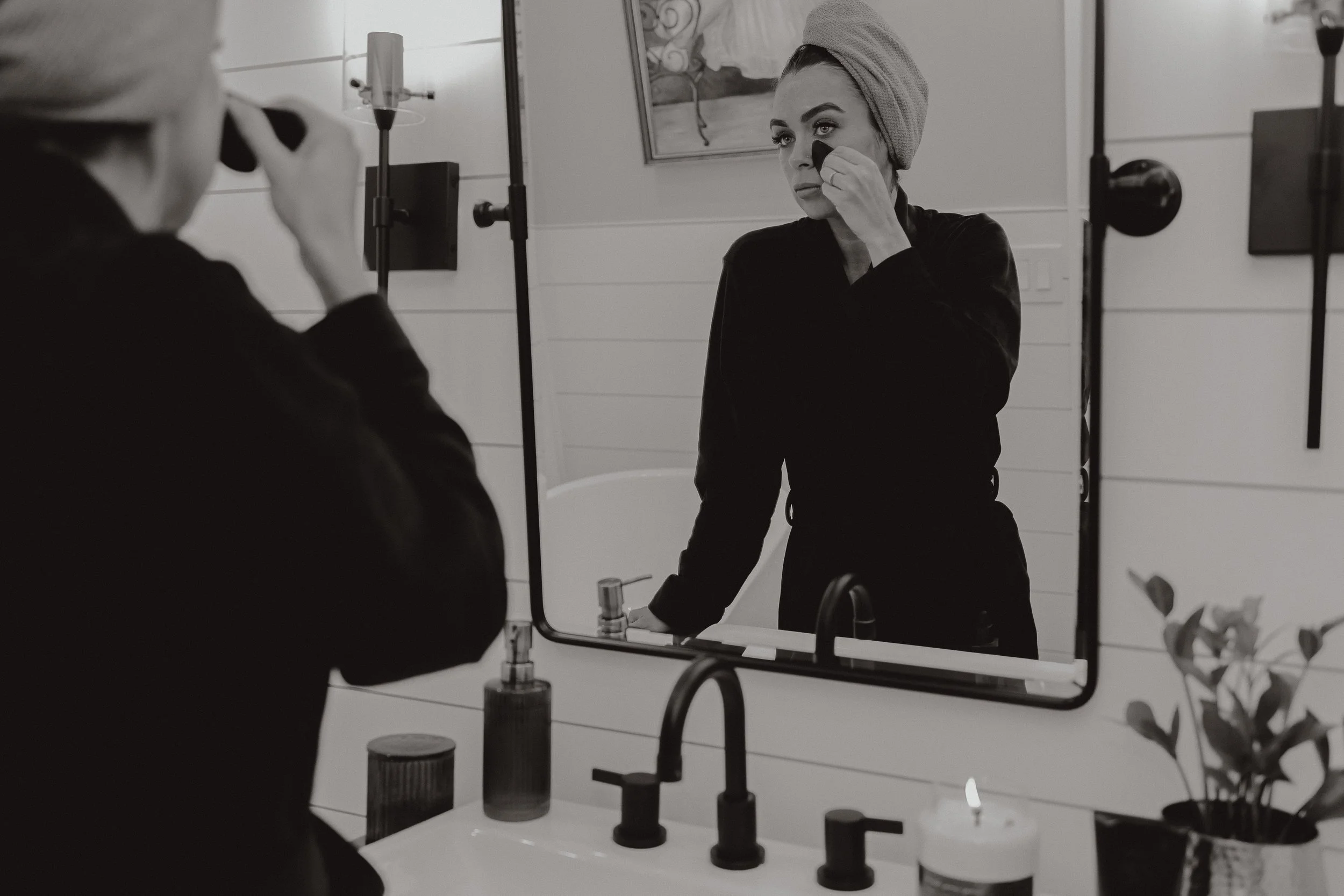AFTER THE BREAKUP: Repairing and Regaining Your Sense of Self (for the recovering co-dependent)
The panic, pain and distress that is commonly felt when a codependent relationship ends is hard to put into words. As a codependent relationship comes to an end, there’s often a “hot & cold” and “on & off” dynamic that makes the break up all the more drawn out and painful.
It can feel like the ground has been pulled out from under you—like your sense of identity, stability, and worth was tied so tightly to another person that their absence leaves you lost and in pieces. For many recovering from codependency, the breakup is not just the end of a relationship—it’s the beginning of an emotional unraveling that, while painful, also holds the potential for deep healing and self-reclamation.
If you're new to the topic of codependency here’s a helpful place to start: Codependency (what it is and how to heal) .
This post is for those navigating that raw aftermath, unsure of who they are without the other, and ready to slowly begin the work of repairing and regaining their sense of self and self respect.
What Is Codependency? (let’s refresh)
Codependency is an unhealthy pattern of emotional and psychological reliance on another person — often at the expense of your own needs, desires, and identity. When you're in a codependent dynamic, you find yourself hyper-focused on your partner’s needs while neglecting your own.
Over time, this can lead to the dissolving of key pillars in your life:
Your friendships
Family connections
Personal routines and self-care
Creative or professional goals
Time for yourself
You say yes when you mean no. You become overly responsible for the other person's mood, actions, and comfort.
You shrink. You disappear. Nothing about this way of being is doing anything of value for you; nothing.
What Gets Lost in a Codependent Relationship?
There’s a lot at stake when you let go of putting energy into yourself, while hyper focusing on your partner, which is often what happens within a co dependent dynamic.
Let’s name the core parts of you that often fall away:
✦ Self-Identity
You lose track of who you are outside the relationship. You may experience anxiety, depression, or even turn to coping behaviors to numb the disconnect.
✦ Self-Awareness
You stop checking in with your own needs, desires, and boundaries — or you feel guilty when you do as it takes the focus off of them.
✦ Self-Care
Basic needs like sleep, nutrition, scheduling doctor’s appointments, or simply doing the little things that you “used” to do for yourself fall off the radar.
✦ Core Values
You begin to bend your values to keep the peace or maintain closeness — even if it means going against what you believe to be true or value.
✦ Boundaries
You expect your partner to “just know” your limits, or you avoid expressing them for fear of conflict or abandonment.
✦ Lack of Autonomy
You may feel unsafe acting independently in the relationship, or incapable of making decisions without the other person.
✦ Self Respect
It’s common to feel very empty and lost after the break up (and even during)- You’ve spent the majority of your energy focusing on another person, so when everything is said and done you find yourself lacking self respect along with your sense of self.
Why Is It So Hard to Leave?
People in codependent relationships often stay because the thought of being alone feels terrifying. They have connected their sense of worth and meaning to another person - often a person who leaves them feeling empty and unappreciated.
Even if the relationship was draining or dysfunctional, you may find yourself longing, obsessing, or questioning your decision to leave.
Why?
Because a codependent relationship often isn't "bad" all the time. Your partner likely had moments of kindness or made promises of change. (this helped you validate why you stay and provided you hope for how it “could be.” ) The unpredictable mix of affection and hurt creates a trauma bond that makes it hard to leave and even harder to think clearly about the relationship.
The 3 R’s of the Codependent Breakup (via Dr. Ramani)
Psychologist Dr. Ramani Durvasula outlines three emotional patterns many people experience post-breakup, especially those healing from codependency:
1. Rumination
You replay the relationship endlessly:
What if I had tried harder?
Maybe I overreacted.
Was it really that bad?
You idealize the potential. You minimize the harm. Rumination is a trauma response — your mind trying to make sense of something that often never made sense to begin with. More about what rumination is here.
2. Regret
You start to blame yourself:
I should’ve seen the red flags.
Why didn’t I leave sooner?
This emotional spiral fuels your inner critic and keeps you stuck in the pain loop. It can even make you vulnerable to reconnecting with a partner who didn’t value you.
3. Reaching Out
You may feel an intense pull to reconnect — seeking closure, answers, or a “do-over.” It’s important to note that this urge is often withdrawal from the trauma bond, not clarity. Reaching out often reopens the wound you’re trying to heal.
What is the Root of Codependency?
Codependency is a dysfunctional relationship pattern that often stems from a combination of factors including childhood trauma, dysfunctional family dynamics, and insecure attachment styles. These experiences can lead to low self-esteem, a distorted sense of self, and difficulty establishing healthy boundaries, all contributing to codependent behaviors in our adulthood relationships.
(see resources below to dive deeper into the root healing that goes into recovering from codependency.)
What the Codependent Might Feel After a Breakup
Shame or feeling “defective”
Intense fear of being alone
Panic, anxiety, or intrusive thoughts
Low self-esteem
Jealousy or fear of being replaced
Obsessive thoughts about your ex — What are they doing now? Have they moved on?
All of this is normal for the codependent to experience — but it doesn’t mean you’re broken. It means your nervous system is trying to recalibrate after losing what it thought was “home.” It’s the consequence from making someone outside of you “the answer” and “the source” of your own worth.
How to Rebuild After Codependency
Recovering from codependency isn’t just about “moving on.” It’s about moving inward — and reclaiming the parts of you that you’ve ignored or intentionally silenced to “keep the peace.”
In a nutshell; rebuilding is about redirecting your energy from them back to you.
Here’s where to begin to rebuild:
✦ Set Boundaries
Reclaim your right to say no, to pause, to prioritize. Boundaries will be your bridge back to self-respect.
✦ Practice Self-Care
It’s the continual small habits that you do daily that helps you maintain your whole body wellness. It's booking the dentist, taking a walk, reconnecting with the special people in your life, it’s keeping the promises that you make to yourself.
✦ Build Self-Esteem
Affirm your worth without needing external validation. Reflect on what makes you authentically you apart from your ability to feel and be needed by someone or something outside of you.
✦ Identify Codependent Patterns
Notice where you seek approval, where you avoid conflict, and where you tend to people-please. Gaining awareness around the behaviors that are in your control and working toward shifting them is the first step to change.
✦ Feel Your Feelings
Let grief, anger, sadness, and fear move through you — feel it. This is where the healing lives. If you find it difficult to “feel your feelings” feel free to read this post on how to do just that here.
✦ Be Assertive
Use your voice. Say what you mean. Ask for what you need. Being direct doesn't make you difficult — it how you lead with self respect my friends.
✦ Meet Your Own Needs
Tend to your body, your desires, your ambitions. Make the decision that self-abandonment is no longer an option.
Takeaway
Healing from a codependent breakup is not linear, as the healing process never is. It’s raw. It’s layered. And it can be empowering, if you allow it to be. You’re not just recovering from a relationship — you’re recovering and reviving your sense of self and self respect.
This. Is. Huge.
The pain you’re feeling isn’t a sign that you should’ve stayed.
It’s a sign that your nervous system is adjusting to freedom. A sense of freedom that’s new, and maybe not even wanted (yet), however that incongruence is normal to the process of coming back into yourself.
Be patient with yourself and continue to focus back to yourself when thoughts of the other try to pull you away from your core.
The huge shift to healing is the recognition that: You’re allowed to choose you now (and you should).
Recommended Somatic Visualization for the Codependent
Find a comfortable space that’s quiet and close your eyes.Visualize a cord that is attached to the core of your body that’s inappropriately connected to “the other” (whoever the codependent relationship is with). Continue to visualize this cord taking all of your energy and resources and sending it to the other. Recognize in this visualization that by having this cord attached to “them” you’re consequently malnourishing and depleting your life force energy. Recognize how you’re dimming your sense of self, light and love by this cord being so wrongly attached to them.
Now, visualize a pair of large scissors cutting the cord and reconnect that cord back into you; where it belongs and where it always needs to stay. Spend time sitting in the sensation of what it feels like to feel light, reviving energy flowing back into your body. Sit with this feeling of replenishing your sense of self respect, self identity and self love as long as it feels good to do so.
resources for healing codependency
Codependent No More by Melody Beattie
Boundaries by Henry Cloud
Women Who Love Too Much by Robin Norwood
Facing Codependence by Pia Mellody
It’s Not You by Dr. Ramani Durvasula
Should I Stay or Should I Go by Dr. Ramani Durvasula
An Invitation For You
If this resonates with you:
Subscribe to my IAMWELL newsletter here, to receive future wellness posts + self growth newsletter topics, comment on this post, or share any reflections: I’d love to hear.
Let’s stay connected. You can find me on Instagram at @IAMKIMEGEL
*Above image by Photographer Amy Lynn Bjornson
How to Establish and Maintain Boundaries
Boundaries are a major buzz word in the world of self help. It’s one of those words that we’ve probably heard, knowing that we’re “suppose to” have them, but what are good boundaries really?
We’re told to have boundaries, but how to you get them?
Having boundaries is a topic that comes up in some way, shape or form with every client that comes my way. I’m going to go out on a limb and say that our ability to have healthy boundaries correlates with how happy and fulfilled we will feel in our relationships and, ultimately, our lives.
Wherever you are in your relationship with boundaries, I’m going to speak a bit about the topic because I feel it’s a game changer to live a life where your boundaries are clear and strong.
As you increase your boundaries you’ll, consequently, up level your overall feeling of happiness and decrease your stress load. This is so because the side effect of having no boundaries leaves us in a consistent rhythm of running around trying to please others while denying our needs. With that said, we each have our own unique relationship with boundaries and it will benefit us to have more knowing around this hot topic.
So, lets get right to it and start evaluating where we are in terms of our relationship with boundaries.
What Exactly Are Boundaries?
Boundaries represent our ability to honor our needs and wants regardless of others expectations of us. Simply put, it’s saying “No” when someone wants us to say “Yes.” It’s drawing a line when we feel like our healthy needs and wants are being ignored or compromised by another’s request.
How Do We Show Up When We Don’t Have Boundaries?
In short; not good, but since that’s not a helpful-slash-professional answer, let me go further.
We people please
We self sacrifice
We look to please others more than pleasing ourselves
We quickly ditch our needs to tend to others needs
We say “Yes” when we actually mean “No”
We take responsibility for what’s not ours
We are Passive Aggressive (Because we are doing things we don’t really want to do)
So, with that said……
Why Don’t We Have Boundaries?
Meaning, why in the world would we do this to ourselves? Why would we actively choose to run around pleasing everyone but ourselves? Honoring others needs at the expense of denying or rejecting ours?
Why Would We Do This!?
There’s lots of reasons why we might be struggling to have clear boundaries within our lives and relationships. Sometimes it’s because we hate conflict and are scared to say “No.” Sometimes it’s because we never learned about boundaries within our family of origins and got thrown out into the world trying to understand why we often get “taken advantage of” or “walked over.”
Side note: Those of us with none or weak boundaries will be a victim of these behaviors.
Let me make a statement that’s so important to remember, perhaps it can be your new mantra….
Repeat after me:
People respect people who respect themselves.
The reality is, even though we will feel uncomfortable laying down boundaries for ourselves, especially if we haven’t done so in the past, clear and consistent boundaries will improve our lives. Straight up. People might not like our boundaries, but they will respect us more for putting them up. Why? Because having boundaries is telling the world that we honor ourselves.
It’s saying:
“Yo, I care about me and I’m going to say no when something doesn’t feel right because I honor myself.”
Whether the person on the receiving end agrees with your boundaries or not, should not be your point of focus. A healthy point of focus when implementing boundaries is to anchor on the fact that you’re making a self serving choice that’s communicating to others how much you care about you. (Most importantly, it’s communicating to YOU that you care about you.) This, in turn, will teach others how to treat you, as that’s what we’re always doing via our actions. (Whether we’re conscious of it or not.)
Which leads to the second mantra I have for you:
I’m teaching others how to treat me by how I’m treating myself.
Great! So now that we have awareness around what boundaries are and how important it is to cultivate them, below is a list of 5 tips on how to start acquiring boundaries. These can be helpful regardless of where you are within your unique process of boundary setting.
How Do You Get Boundaries If You Have None? (5 Tips)
1. Get In Tune With What You Need
HOW: Taking time for yourself will increase the volume on your inner, intuitive self. As the noise decreases and we give ourselves time and space, we often can come to a place of greater clarity. This clarity will help us to see new perspectives and, ultimately, lead us to grow.
2. Honor Your Needs by Taking Positive Action
HOW: Little choice by little choice is how big change occurs. If you commit to taking small actions consistently, you will notice an overall shift in your life.
3. Watch Overdoing Yourself and the Over Compensation Of Your Time and Energy
HOW: Look for the virtue of reciprocation within your relationships. Healthy relationships have an organic balance to them. It’s not “tit for tat,” it’s just a flow. Watch your old patterns of over giving and eliminate subjecting yourself from taking on more than you can handle. BALANCE is your focal point with this one.
4. Find Coping for the Guilt & Discomfort That Arises As You Honor Your Boundaries
HOW: Remind yourself that establishing and holding your boundaries is how you respect yourself. In the long run, leading with this way of functioning will produce a more positive outcome. (In the short term, it may be gut wrenchingly hard, but please hang in there) Having boundaries is a win/win. As the guilt and discomfort appears with saying “No,” practice sitting with this emotion by allowing it to be there. (Hey guilt, what’s up?) It sounds simple, but it’s a practice that will take some time. As you put attention to this practice, over time, the guilty feelings will weaken and you’ll be able to make healthy choices without so much discomfort.
5. Get Used To Taking Up Space
HOW: Watch your ability to over apologize. Be mindful of your habit of comparing yourself to others with the false story that someone is “better” than you. So untrue my friend. Practice being in a room with an open heart and standing rooted in who you are. Allow your voice to be heard and your words to be expressed. Take up some dang space please. Know that you’re worthy of it.
There can be some relationships that we find more challenging to hold our boundaries with than others. This is common. The truth is that some relationships are going to fall away as we set a healthy framework for ourselves. This can be really hard, although, hang in there because any relationship that prefers you to constantly “do” for them is not a relationship that is going to build you up. Boundaries shine the truth on relationships. The truth can hurt, although it’s better to see it than pretend and deny reality.
People that care about us are going to understand and respect our boundaries/ They may not like them, but they’ll understand and adjust accordingly.
I’m going to say that again: The people who genuinely love us are going to be able to adjust to our new and healthy boundaries. The relationships that aren’t willing to meet you half way will fall away. Trust this process.
Gaining and implementing boundaries within your life is a skill set that will forever benefit you. Honor yourself in this life by having clarity around what your boundaries are and having the courage to stand strong beside them.
*Image by Amy Lynn Bjornson, lifestyle & wedding Photographer.
Feel free to SUBSCRIBE to my channel.






























